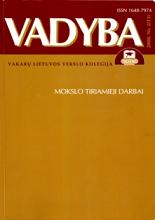VADOVAVIMAS BENDROJO LAVINIMO MOKYKLAI: OPTIMIZAVIMO ASPEKTAS
SECONDARY SCHOOL LEADERSHIP IN THE ASPECT OF OPTIMIZATION
Author(s): Julija MelnikovaSubject(s): Social Sciences
Published by: Lietuvos verslo kolegija
Summary/Abstract: A review of research literature on school effectiveness has identified leadership as a dominant factor in effectiveness. School leadership is the positional power of the principalship, and is defined as the influential behavior that results in the increased effectiveness of the school. There are various conceptions of lea-dership. Eminent among these are the instructional, transactional, and transformational models of leadership. The literature con-firms that there is a relationship between the level of effectiveness of the school leadership and the degree of school effectiveness, so it is important to deconstruct leadership to examine the extent to which the various models facilitate the conditions that allow for school effectiveness.Emerging from above stated concerns, the thesis specifical-ly sought to answer the following question: How and which characteristics of leadership models relate to school effective-ness?The object of the research: models of leadership in secondary schools. The objectives of the research:1. To disclose theoretically the phenomenon of leader-ship and the existing models of leadership. 2. To prepare and implement the design of empirical re-search on leadership models. 3. To interpret the results of the research and provide recommendations for the optimization of leadership in secondary schools. The methods of the research: Quantitative: anony-mous survey in writing; The survey involved 285 secondary school teachers and 47 secondary school leaders from 65 schools, located in different districts of 10 counties of the Republic of Lithuania. The data collected was weighted using statistical programming SPSS. Depending on data specifics different statistical methods were applied: Therefore the article is divided into four sections. The first section looks at theoretical aspects of leadership models in school: examines the issue of leadership through a focus of history of management, provides a basis for analysis of leadership models. The third section suggests empirical evidence on research ques-tions. The final section addresses the principal and his or her role in the overall success of the school providing recommendations for leadership optimization. The implementations of the research: Without doubt the empirical evidence that came out of the research efforts is of critical importance. The school, reflecting on the demands of society, should be delivering. Acknowled-ging with such demands provokes the role of principal become complex, emphasizing that of change agent, financial planner, and entrepreneur. This role far exceeds that of instructional leader. Instructional leadership while suitable for addressing first order changes such as curriculum innovation is inadequate for the kind of systemic changes demanded by the school re-form movement.
Journal: VADYBA
- Issue Year: 13/2008
- Issue No: 2
- Page Range: 99-106
- Page Count: 8
- Language: Lithuanian

